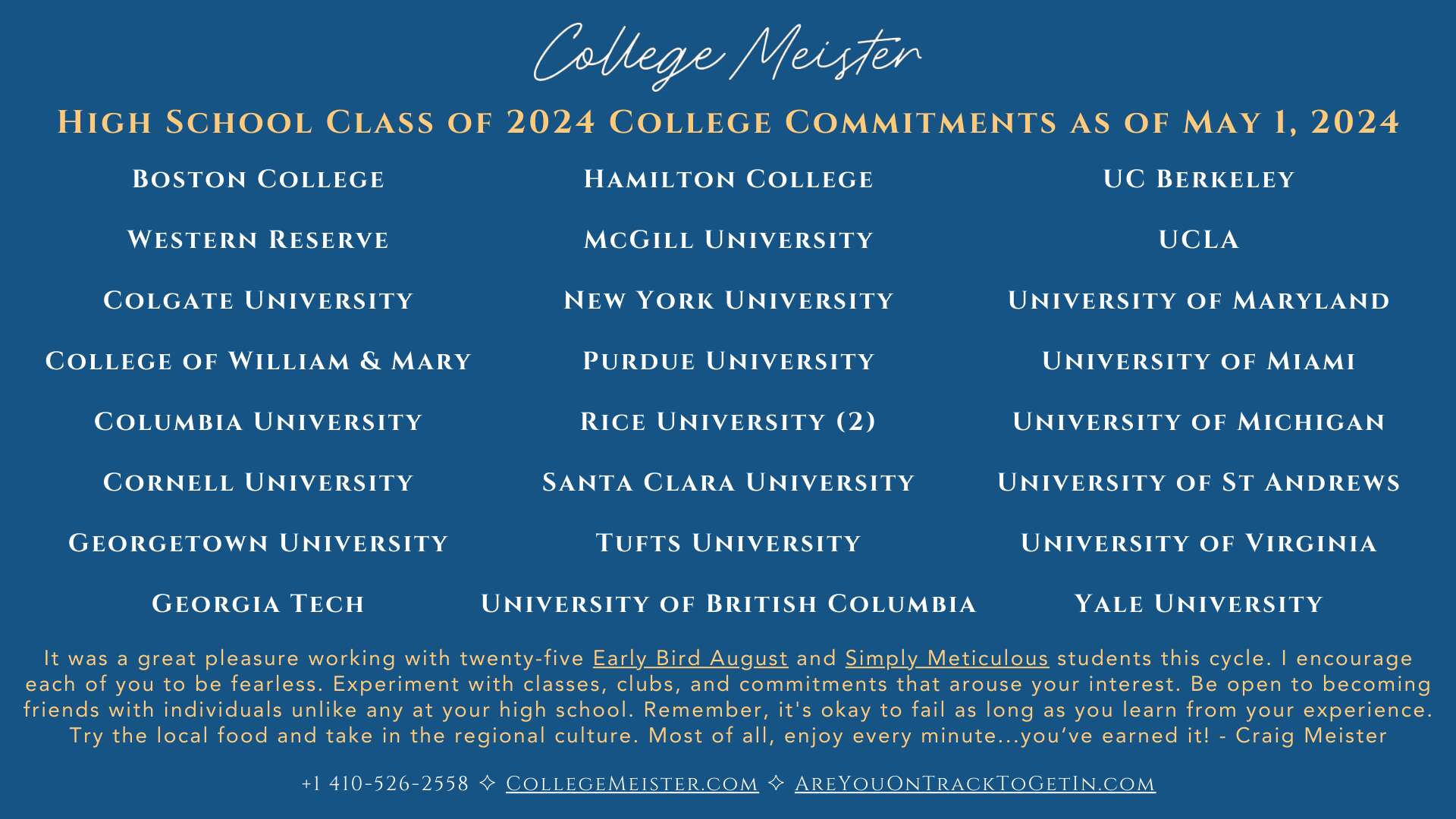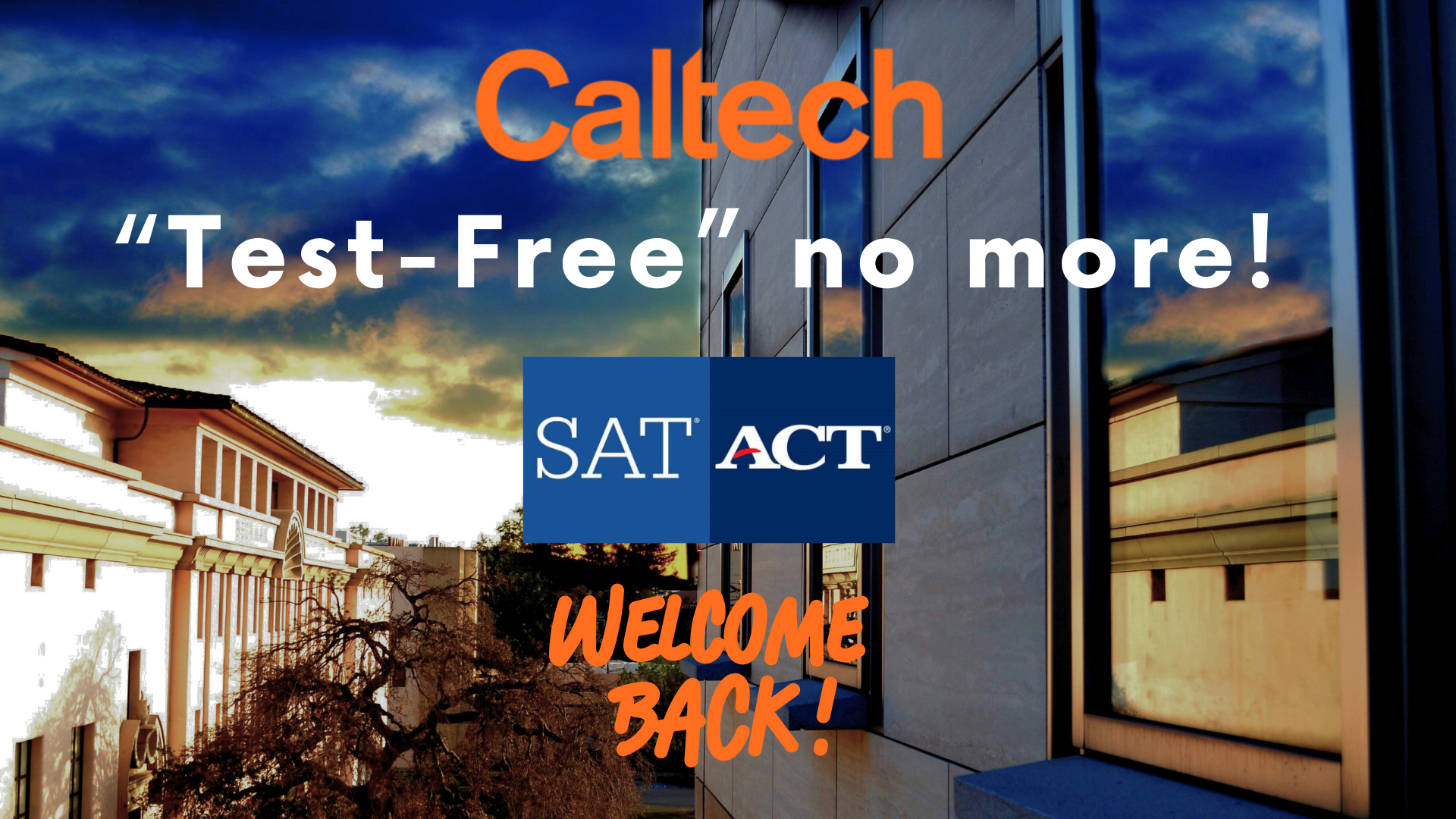 The amazing members of the CollegeMeister Class of 2024 have committed to attend impressive colleges and universities across America and beyond. Congratulations to each and every one of you, and thank you for allowing me to join you on this journey.
The amazing members of the CollegeMeister Class of 2024 have committed to attend impressive colleges and universities across America and beyond. Congratulations to each and every one of you, and thank you for allowing me to join you on this journey.
It was a great pleasure working with twenty-five Early Bird August and Simply Meticulous students this cycle. I encourage each of you to be fearless. Experiment with classes, clubs, and commitments that arouse your interest. Be open to becoming friends with individuals unlike any at your high school. Remember, it’s okay to fail as long as you learn from your experience. Try the local food and take in the regional culture.
Most of all, enjoy every minute…you‘ve earned it!


 7. The Importance of Networking
7. The Importance of Networking Applying to college is a significant milestone in a high school student’s life. The process can be both exciting and daunting and filled with numerous tasks and deadlines. Successfully navigating this journey requires careful planning, research, and attention to detail, which is why it’s important to review practical tips for applying to college, helping you manage the complexities of the application process, and improving your chances of acceptance.
Applying to college is a significant milestone in a high school student’s life. The process can be both exciting and daunting and filled with numerous tasks and deadlines. Successfully navigating this journey requires careful planning, research, and attention to detail, which is why it’s important to review practical tips for applying to college, helping you manage the complexities of the application process, and improving your chances of acceptance. In order to get into many selective American colleges and universities as a first-year student, a college applicant often needs to get two strong letters of recommendation from two different teachers he or she has had in academic courses during high school and these letters of recommendation must be submitted to colleges on the student’s behalf by each college’s application deadline.
In order to get into many selective American colleges and universities as a first-year student, a college applicant often needs to get two strong letters of recommendation from two different teachers he or she has had in academic courses during high school and these letters of recommendation must be submitted to colleges on the student’s behalf by each college’s application deadline.
 Imagine walking into a workplace where every detail is designed to ensure your health and safety. This is the everyday reality created by professionals in industrial hygiene, who play a crucial role in preventing workplace injuries and illnesses. This field not only keeps employees safe but also promotes a culture of health and environmental responsibility across industries. These professionals play a crucial role in keeping workplaces safe for employees and can help reduce incident rates in facilities significantly.
Imagine walking into a workplace where every detail is designed to ensure your health and safety. This is the everyday reality created by professionals in industrial hygiene, who play a crucial role in preventing workplace injuries and illnesses. This field not only keeps employees safe but also promotes a culture of health and environmental responsibility across industries. These professionals play a crucial role in keeping workplaces safe for employees and can help reduce incident rates in facilities significantly.
 The University of Edinburgh’s Law School has recently launched an
The University of Edinburgh’s Law School has recently launched an  Wandering through the cobbled streets of the Old Town, one is transported back in time, with centuries-old buildings and narrow wynds whispering tales of kings and rebels. The Royal Mile, the city’s ancient thoroughfare, is a bustling hub of activity, lined with quaint shops, cozy pubs, and historic landmarks like the majestic St. Giles’ Cathedral. Meanwhile, the elegant Georgian architecture of the New Town exudes sophistication, with wide boulevards and neoclassical buildings showcasing the city’s more refined side.
Wandering through the cobbled streets of the Old Town, one is transported back in time, with centuries-old buildings and narrow wynds whispering tales of kings and rebels. The Royal Mile, the city’s ancient thoroughfare, is a bustling hub of activity, lined with quaint shops, cozy pubs, and historic landmarks like the majestic St. Giles’ Cathedral. Meanwhile, the elegant Georgian architecture of the New Town exudes sophistication, with wide boulevards and neoclassical buildings showcasing the city’s more refined side.
 Career transitions have become increasingly common as professionals seek to adapt to changing industries, pursue new passions, or enhance their skill sets. Yet, a successful career transition can be challenging and require time, dedication, and often additional education or training.
Career transitions have become increasingly common as professionals seek to adapt to changing industries, pursue new passions, or enhance their skill sets. Yet, a successful career transition can be challenging and require time, dedication, and often additional education or training. On the heels of Harvard
On the heels of Harvard